National Food Strategy – call for evidence

Executive summary
* In August 2019, plans were announced to devise a National Food Strategy for England. The strategy aims to establish a food system that meets a number of goals – from human health to sustainable agriculture.
* Submissions were invited to be received by 25th October 2019. Responses were required to be 1,000 words or fewer – excluding references and supporting material. This week’s note contains my (verbatim) submission.
* There were many approaches that could have been taken. I decided to focus on the nutritional aspect of food, with just a brief mention of conflicts of interest and the need to protect topsoil.
* I took the same approach that I took at the College of Medicine conference in London last week when I gave a presentation with the title: What should we eat? Essential nutrients are things that we must consume in our diet. Given this fact, it seems obvious to ask – where do we find those essential nutrients? From essential fats, to complete protein, to vitamins, and to minerals – there is a consistent answer to the question: what should we eat? Unfortunately, the answer doesn’t match current dietary advice.
Introduction
On 16th August 2019, plans were announced to devise a National Food Strategy for England. (This is just one of the four parts of the UK, but invariably Wales, Scotland and Northern Ireland adopt English government initiatives). A video was launched to announce the aims (Ref 1). I watched the video at the time, and I was surprised to see, when I went back to view it yesterday, that it had been viewed just 253 times – a few of those having been me!
The important aspects of the terms of reference are purpose – what does the strategy hope to achieve? Scope – how broad a remit does it have? And timing – when will it deliver? The answers from the literature accompanying the initiative are (Ref 2):
Purpose: It is intended to be an overarching strategy for government, designed to ensure that our food system:
– delivers safe, healthy, affordable food; regardless of where people live or how much they earn;
– is robust in the face of future shocks;
– restores and enhances the natural environment for the next generation in this country;
– is built upon a resilient, sustainable and humane agriculture sector;
– is a thriving contributor to our urban and rural economies, delivering well paid jobs and supporting innovative producers and manufacturers across the country;
– delivers all this in an efficient and cost effective way.
Scope: The strategy will cover the entire food chain, from field to fork: the production, marketing, processing, sale and purchase of food (for consumption in the home and out of it), and the consumer practices, resources and institutions involved in these processes.
Timing: The review will be published in “summer 2020.”
Inputs of 1,000 words or fewer were invited to be submitted by 25th October. The word limit was quite a challenge, as there are so many issues with our current food system to address. I decided to focus on what we need to consume (essential nutrients) and where those nutrients are found and the fact that our current diet is nutritionally deficient.
The key message in the launch video was: “Together we have the opportunity to build a food system that not only provides the food that we enjoy that we eat with our friends, but that does so in a way that keeps us healthy and restores and enhances the environment.”
I quoted this message in my submission email with the words: There is a way to keep humans healthy and to restore the environment, but it is the opposite of current beliefs. You’ve kindly asked for “your ideas, your dreams about how we could create a better food system.” You’ve invited us to “Send us the evidence that supports your ideas and suggestions.” This is my response…
————— My submission —————
Why do we eat?
We seem to have forgotten why we eat. We eat because there are certain things – “essential nutrients” – that we must consume.
The three macronutrients are fat, protein and carbohydrate. There are essential fats (omega-3 and omega-6). There are essential proteins (the amino acids that the body can’t make). There are no essential carbohydrates (Ref 3).
The micronutrients comprise 13 essential vitamins (8 water-soluble B vitamins and vitamin C and 4 fat-soluble vitamins – A, D, E and K) and approximately 15 essential minerals (calcium, chloride, chromium, copper, iodine, iron, magnesium, manganese, molybdenum, phosphorus, potassium, selenium, sodium, sulphur and zinc).
What should we eat?
The optimal diet for human beings is the one that provides the essential nutrients.
Essential fats are found in every food that contains fat – and that means every food other than sucrose – even if only in trace amounts. The body needs essential fats and it needs them in the right form. For omega-3 that’s DHA and EPA. Foods of animal origin (meat, fish, eggs and dairy – especially oily fish) provide DHA and EPA. Plant foods provide ALA, which is not what the body needs. Conversion from the plant form is possible, but extremely poor.
The body needs essential fats and it needs them in the right ratio. This has historically been a ratio of 1:1. A ratio of up to 4:1 in favour of omega-6 may still be healthy. Nowadays the ratio is closer to 15/1-16.7/1 in favour of omega-6, which is unhealthy (Ref 4). Foods of animal origin provide omega-3 and omega-6 in healthier ratios than plant foods. The whole beef carcass has an omega-6 to omega-3 ratio of 2.4 (Ref 5). Whole milk’s ratio is 1.6 (Ref 6). Oily fish contains much higher amounts of omega-3, making mackerel’s omega-6 to omega-3 ratio 0.1 (Ref 7). Eggs balance fish, with a ratio of 15.5 (Ref 8). Foods of plant origin – especially unnatural concentrated foods, like sunflower oil, can have ratios as high as 65,000 to 0! (Ref 9). Walnuts have a ratio of 65:1 (Ref 10). Brown rice has a ratio of 23:1 (Ref 11) Consumption of animal foods provides essential fats in the right form and in the right ratio.
Complete protein is found in animal foods. Single plant foods don’t provide all essential amino acids in the right amount. Plant foods can be combined to provide complete protein, good luck with that.
In every circumstance where micronutrients come from animals and plants, the body needs the former. With vitamin A, the body needs retinol (from animals) not carotene (from plants). Conversion from carotene to retinol is possible, but poor (Ref 12) and not possible in some people (Ref 13). With vitamin D, the body needs D3 rather than D2. With vitamin K, the body needs K2 rather than K1. Heme iron, exclusively found in meat and seafood, is optimally absorbed.
The two food and nutrient tables below (one per 100g, one per 100 calories) report key nutrients extracted from the United States Department of Agriculture all-foods database (Ref 14). A common item of offal, red meat, white meat, oily fish, eggs, dairy, green vegetable, starchy vegetable, fruit and grain has been selected (Ref 15).
The number in bold is the ‘winner’ in that row. The number in brackets after each nutrient is the recommended daily intake for that nutrient. Liver is the most nutritious food by a margin (and one of the cheapest). Animal foods generally are nutritionally superior. Vegetables are of value, especially greens, but fruit is rather pointless. So-called ‘healthy whole grains’ aren’t really.
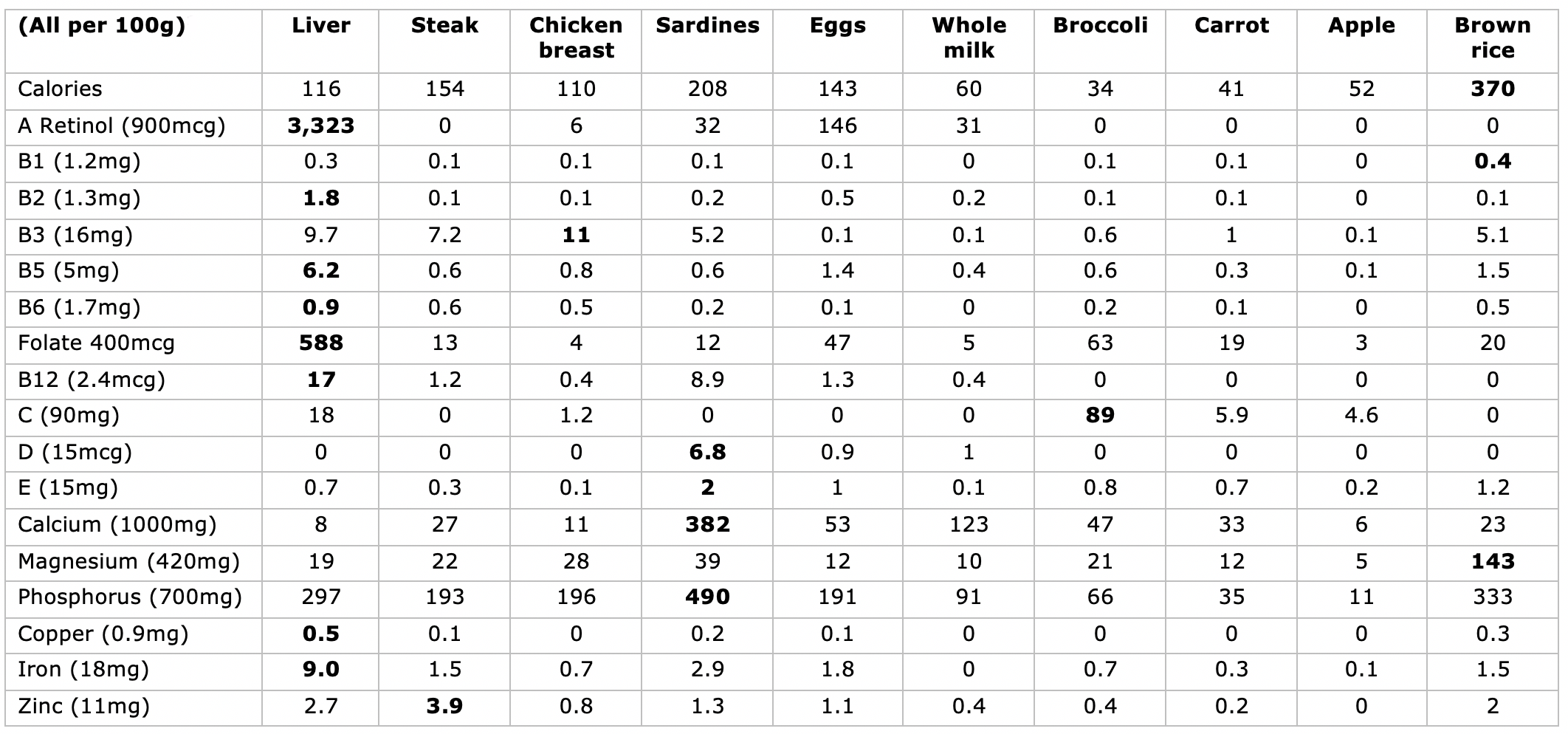
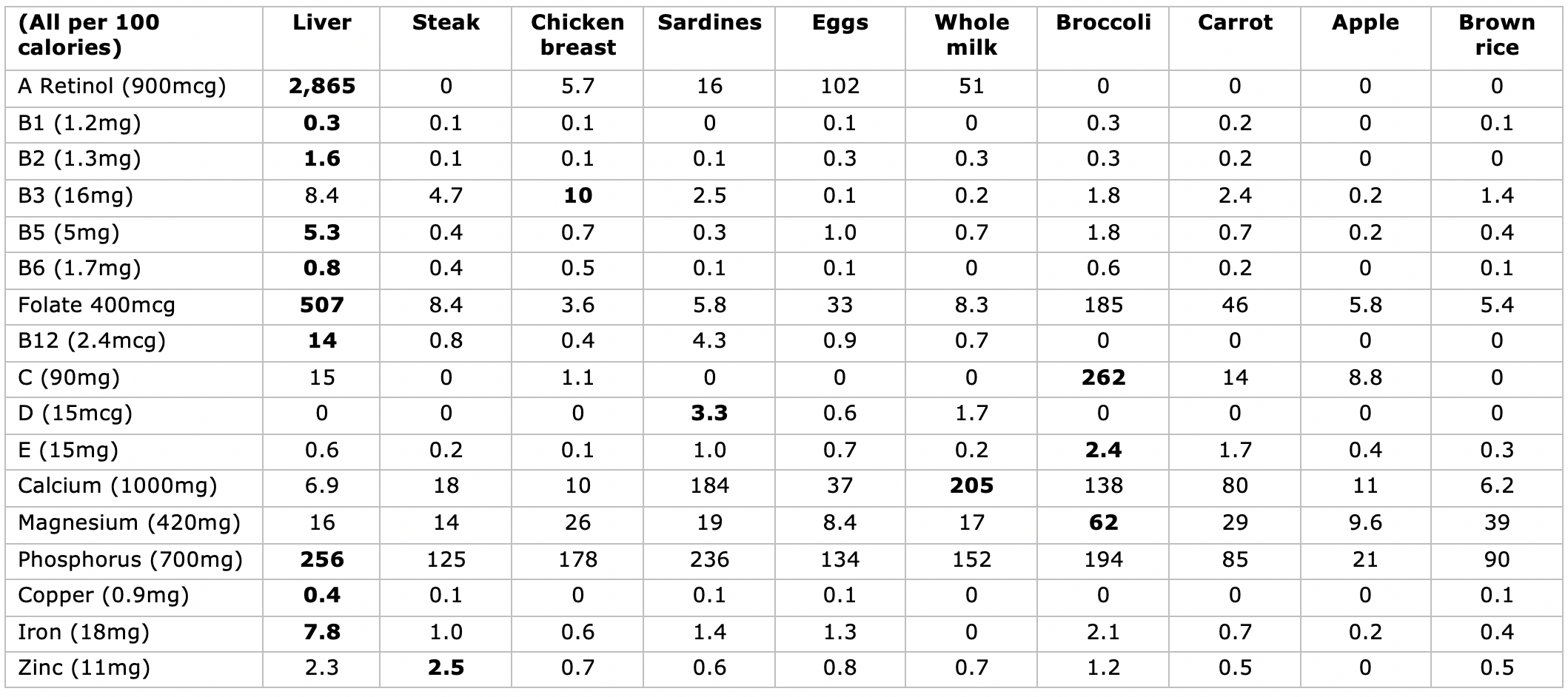
Below is a summary of what we are currently advised to eat (vegetables, fruit, grains, legumes and vegetable oils) vs the most nutritious food groups (meat, fish, eggs and whole dairy) when measured against essential nutrients. What we are advised to eat lacks essential fats in the right form, complete protein, retinol, D3 and B12. The vegetable oils that we are advised to eat are spectacularly useless. Animal foods provide what humans need.
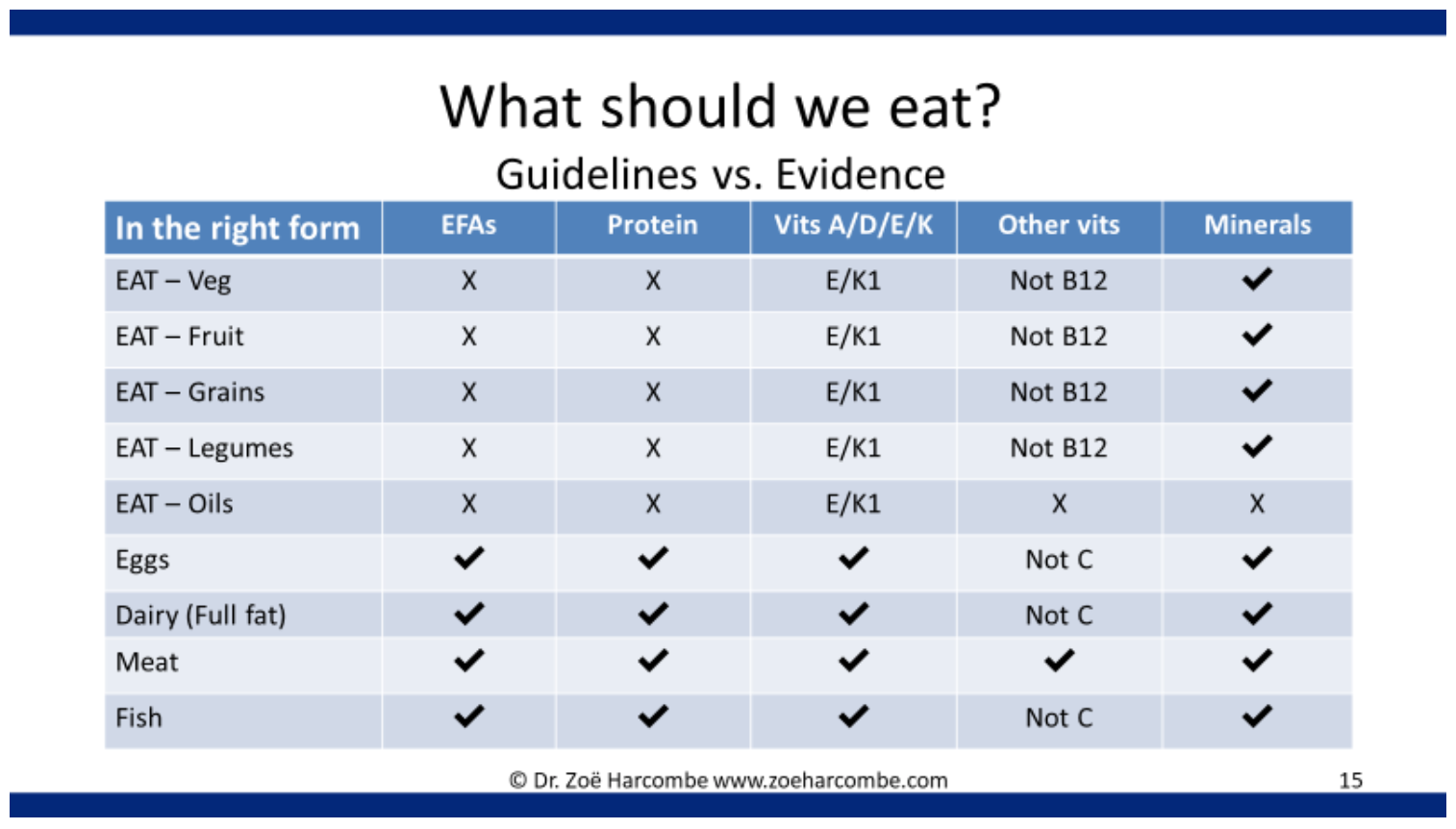
Nutritional deficiency
Government Family Food Surveys consistently report the UK’s nutritional deficiencies. The 2015 report confirmed that retinol intake was half the recommended amount (Ref 16). Vitamin D intake was barely one fifth of requirements. Vitamin E was deficient, and vitamin K not even reported. Nothing is being done about this nutritional crisis. Emergency instructions should be issued to eat more animal fat. Instead it is demonised, while carbohydrates are eulogised.
When the ‘eatwell’ plate became the ‘eatwell’ guide (March 2016), five menus were published by Public Health England (PHE), which I analysed and averaged. The PHE recommended diet is deficient in: retinol (less than a quarter of the recommended amount); vitamin D (approximately a quarter was provided); vitamin E (less than half); calcium was inadequate; K2 was not reported, but would have been deficient, given the extraordinarily low-fat meals (Ref 17).
The EAT Lancet diet was published in January 2019 (Ref 18). I analysed its nutritional value and similarly found serious deficiencies in the fat-soluble vitamins (retinol, vitamin D, vitamin K). Calcium, iron, EPA, and DHA were also deficient, as would B12 be if the optional, paltry, animal foods were not consumed. I submitted a letter to the Lancet pointing this out. The letter was not published. I published the correspondence here (Ref 19).
The environment
Fortunately, prioritising meat and dairy from pasture fed ruminants is also the right way to eat to protect the environment and our future. Without ruminants grazing the land, we will have no topsoil and thus no ability to feed the world naturally. The agri-chemical companies behind The EAT Lancet diet (below) gain in a world without soil. Everyone else loses.
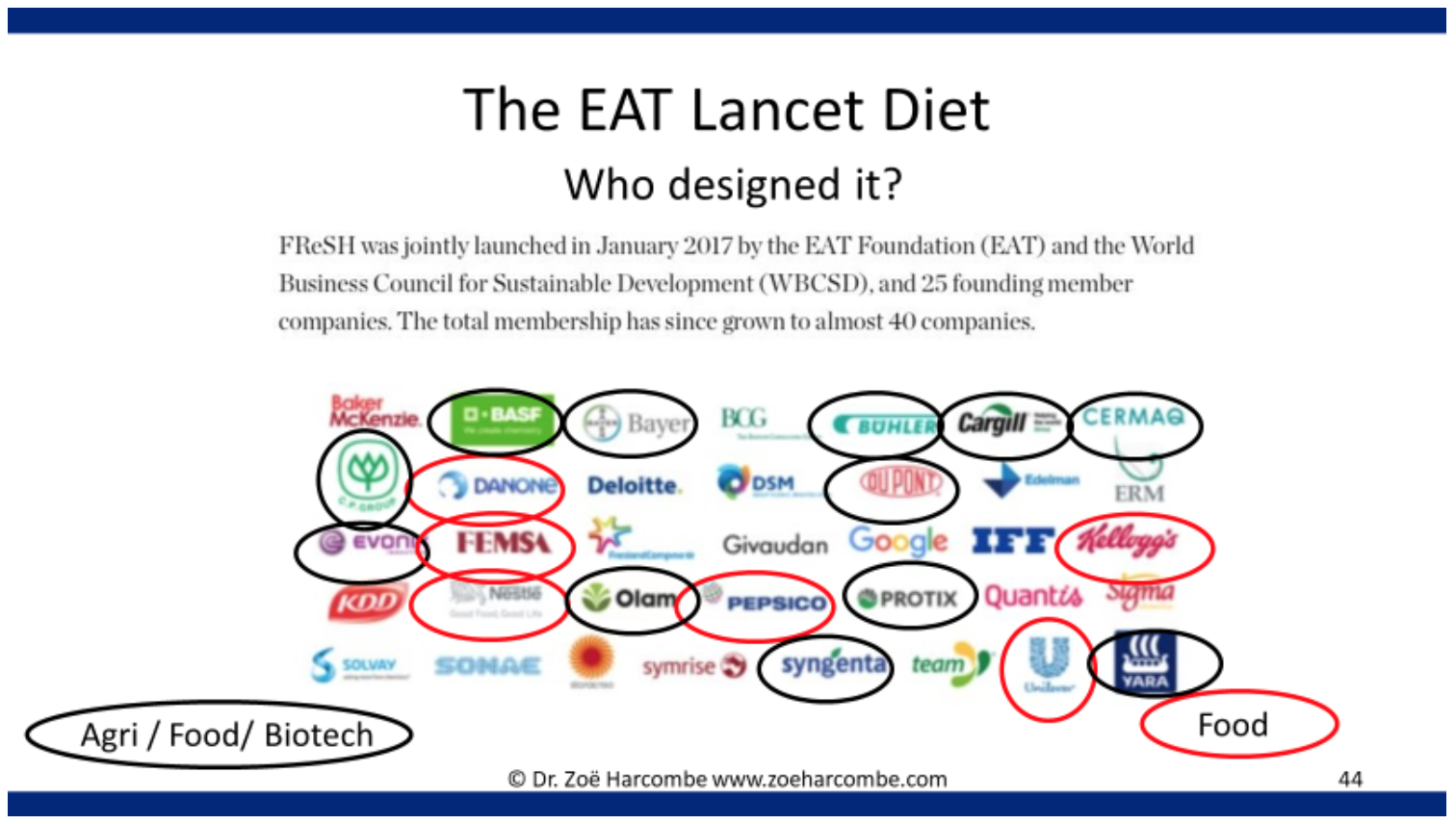
Summary
Our food strategy should be:
1) Eat real local food;
2) Choose that food for the nutrients it provides.
That means staple foods for British people should be meat, dairy, fish, eggs and vegetables. Seasonal fruit, wheat, barley, oats and potatoes meet (1) more than (2), but can also play a valuable part. We should not be eating bananas all year round or American cookies at any time.
References
Ref 1: https://www.youtube.com/watch?reload=9&reload=9&v=yGB41LtcGW0
Ref 2: https://www.gov.uk/government/publications/developing-a-national-food-strategy-
Ref 3: “The lower limit of dietary carbohydrate compatible with life apparently is zero, provided that adequate amounts of protein and fat are consumed.” (p275) The Panel on Macronutrients. Dietary Reference Intakes for Energy, Carbohydrate, Fiber, Fat, Fatty Acids, Cholesterol, Protein, and Amino Acids (Macronutrients): The National Academies Press, 2005.
Ref 4: Simopoulos. The importance of the ratio of omega-6/omega-3 essential fatty acids. Biomed Pharmacother. 2002. (Cited over 3,200 times) https://www.ncbi.nlm.nih.gov/pubmed/12442909
Ref 5: https://nutritiondata.self.com/facts/beef-products/3186/2
Ref 6: http://nutritiondata.self.com/facts/dairy-and-egg-products/69/2
Ref 7: https://nutritiondata.self.com/facts/finfish-and-shellfish-products/4072/2
Ref 8: https://nutritiondata.self.com/facts/dairy-and-egg-products/111/2
Ref 9: https://nutritiondata.self.com/facts/fats-and-oils/572/2
Ref 10: http://nutritiondata.self.com/facts/nut-and-seed-products/3138/2
Ref 11: https://nutritiondata.self.com/facts/cereal-grains-and-pasta/5706/2
Ref 12: “The accepted 6:1 equivalency of beta-carotene to preformed vitamin A must be challenged and re-examined in the context of dietary plants.” Solomons, N. W. and J. Bulux. “Plant sources of provitamin A and human nutriture.” Nutrition Review, July 1993.
Ref 13: “Diabetics and those with poor thyroid function cannot make the conversion. Children make the conversion very poorly and infants not at all.” Sally Fallon and Mary G. Enig, “Vitamin A”, (March 2002).
Ref 14: Not all nutrients are available e.g. vitamin K and biotin are not well reported. Sodium and potassium have been omitted, as they are ubiquitous. It is worth noting that micronutrient targets are likely to be low, as they were originally developed as minimums required.
Ref 15: Liver: http://nutritiondata.self.com/facts/poultry-products/666/0
Steak: http://nutritiondata.self.com/facts/beef-products/7493/0
Chicken breast: https://nutritiondata.self.com/facts/poultry-products/701/2
Sardines: http://nutritiondata.self.com/facts/finfish-and-shellfish-products/4114/2
Eggs: https://nutritiondata.self.com/facts/dairy-and-egg-products/111/2
Whole Milk: https://nutritiondata.self.com/facts/dairy-and-egg-products/69/2
Broccoli: http://nutritiondata.self.com/facts/vegetables-and-vegetable-products/2356/0
Carrot: https://nutritiondata.self.com/facts/vegetables-and-vegetable-products/2383/2
Apple: http://nutritiondata.self.com/facts/fruits-and-fruit-juices/1809/2
Brown rice: http://nutritiondata.self.com/facts/cereal-grains-and-pasta/5706/2
Ref 16: A National Statistics Publication. The Family Food Survey. In: DEFRA, ed.: The Department for Environment, Food and Rural Affairs, 2015.
Ref 17: https://www.zoeharcombe.com/2018/07/the-eatwell-guide-is-nutritionally-deficient/
Ref 18: Willett W, Rockström J, Loken B, et al. Food in the Anthropocene: the EAT Lancet Commission on healthy diets from sustainable food systems. The Lancet 2019.
Ref 19: https://www.zoeharcombe.com/2019/03/letter-to-the-lancet-re-eat/



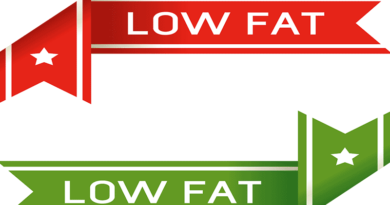


Love all your posts Zoe! Do scientists ever wonder why people were slimmer and children were healthier in the 1960’s and 1970’s??? I grew up stick thin drinking school milk everyday (full fat) and we NEVER had snacks at school. I also remember the DRIPPING JAR which was a feature of every household before 1980’s. This jar was the collection of fat from the Sunday roast which was used in the week to fry everything. WHY WERE WE ALL SO SLIM????? I also remember NIMBLE BREAD (low carb bread) . Slimmers in the 1960’s and 1970’s were advised to cut down on STARCH not fat!!!! I think history should be compulsory study for todays doctors!!!!
What a breath of fresh air, thanks for this.
While you say what’s deficient in the average diet, I feel more emphasis should be given to what’s bad, namely added sugar and refined starches. If you’ve ever listened to Robert Lustig and his explanation of the biochemistry of fructose metabolism, you’ll be convinced that sugar is at the heart of the current epidemics in diabetes and cardiovascular disease. Georgia Ede has explained how high carb diets are responsible for the epidemic in Alzheimer’s and mental health problems. High sugar diets are probably also responsible for most neurodegenerative diseases like Parkinson’s, MS, fibromyalgia, migraine etc. Also, specifically vitamin K2-7 affects how the body makes use of calcium, which affects things like osteoporosis, and calcification of the cardiovascular system as explained by Kiran Krishnan.
Hi Zoe, speaking as an Organic beef and sheep farmer this article really gives me the feeling that I am in the right business. You can`t beat meat and two veg for a balanced diet. However I would urge you to include the humble element Boron in your list of esentials. It is needed in plants animals and humans for the uptake and mobilisation of Calcium. I don`t think it is present much in animal products or cereals, much more in fruit and veg, though levels have dropped due to chemical driven farming. It is very important to prevent arthritis setting in as we get older.
Hi Erland
Many thanks for this – I just go for the basics to start with – to show how bad our dietary advice is. Essential proteins, essential fats, vitamins and minerals. There are many more – Boron is a good example, Choline is another (another reason to eat eggs). You also raise the very valuable point that the nutrient density recorded in databases like the USDA one is likely to be the maximum amount. Soil quality, food miles, poor storage, cooking etc can all deplete what we might think we’re getting. No wonder we’re so unhealthy as populations nowadays!
Best wishes – Zoe
Excellent post.
I wish you would send it to the Scottish government in Holyrood too. So far the only thing they have come up with to combat obesity is a sugar tax so now all the irn bru drinkers get their fix with aspartame.
That was excellent!
However I expect it to be ignored. Why? Look out my back window and you will see acres and acres of carbs – wheat, sugar beet, potatoes, peas, barley – and margarine – rape (canola). The grazing cows and sheep are tucked away on land that cannot be cropped.
All those heart-healthy vegan seed crops are grown with animal manure. When that is gone they will be forced to use synthetic fertiliser which does not have the same benefits to the environment. Add up the consumption of diesel, sprays and fertiliser and the energy used to manufacture and transport them. and the energy used to make fake meat from pea protein isolate and byproducts of oil refineries and compare to a grazing animal which needs little input – someone described cows as solar powered bioreactors. Carbs and margarine rule for purely economic reasons. Health is not really a consideration. That includes soil health and ecology. With the coming of Veganworld this will get even worse. I see this as inevitable and hard to back out from. Science has taken a back seat to religion and profits.
Still, keep on keeping on!
Thank you Chris and for your continued support for what I do – I really appreciate it. :-)
Just to amplify my point, most of the arable farms are family owned, with employees or contractors, and despite their huge turnover there are years they don’t make a profit. Their output goes to the Foodlike Substance Manufacturing Industry, often multinationals, who make so much profit they can afford to bankroll EAT-Lancet for example.
Most of the livestock farms are also family owned. Their output goes to a local slaughterhouse/meat packing plant and to local butchers and farm shops, so the money stays in the area. No excess profits to finance the mythical “meat lobby” who are alleged to employ you.
Hi Chris
So sorry about the tardy reply – we’re over at a conference in Israel with a crazy schedule!
No one employs me! I have been offered money by organisations and I say no – my independence from everyone is more important.
Best wishes – Zoe
Stay strong I think you are wonderful. You have done the research. I love it!
Thanks so much Peter – blush icon!
Brasil / são Paulo / Interior
Congratulações
Thank you, Zoe. I really admire your tenacity and determination to see change. This is great and very straight to the point. It’s still quite challenging to make this shift from conventional belief that we require large amount of carbohydrates in our diet despite emerging evidence showing this is not the case. I love the key message which you always convey to eat real food and ditch fake foods. A lot needs to change but it has to start from somewhere, slowly but surely. Please continue to keep up the good work!
Hi Mobola
I’m so sorry for the tardy approval. This one ended up in spam – outrageous! Probably the honey! ;-)
Thanks for your lovely message.
Best wishes – Zoe
Hi Zoe, this is brilliantly written, let us pray it is not ignored. Thankfully I don’t care much for bananas! This is how our food and agriculture used to be, it shouldn’t be such a difficult fight.
Given that our ‘health policies’ (what a joke) are guided/driven/purchased by the fake food industry, have you ever looked into what proposals such as yours would cost them? Just curious. I suspect they will throw everything they have at this Strategy, so let’s hope this shines a light on their greed and insincerity.
Good luck.
Hi Jenny
Thanks so much for your lovely note. I did just briefly look at the employment hit once and it’s about 400,000 jobs. It is a serious deterrent and I have heard someone quote someone in government saying that this is a consideration of theirs – above health…
It would make sense for jobs, GDP, tax etc to be more important than health. People dying early helps the pension crisis too – quite seriously!
Best wishes – Zoe
Zoe – your submission is a thing of beauty; simply wonderful, logical, unarguable (although many will try), commonsensical. I could go on. It reminded me of my annoyance over the weekend to find a mid-90s recipe which had been modified in my handwriting, replacing butter with olive oil and creme fraiche with low fat creme fraiche!!! And that took me back to the 80s, when as a student, I thought I was doing the right thing drinking skimmed milk and litres of cartoned orange juice and eating huge quantities of wholemeal bread with Flora Light. So, so frustrating, even now. It really p***es me off!
Hi Philip
You’re too kind – thanks so much
Best wishes – Zoe
The level of frustration is relative to age Philip. I can remember scoffing in the 70’s at my father’s breakfast every day – bacon, eggs, (sometimes fried bread, but we’ll ignore that one), mushrooms etc. I knew way better with my margarine and other rubbish. The older you are, the more regret at the years gone by of eating crap. Dad passed away in January this year, aged 97.
Go Zoe! Your commitment is such an inspiration. It was amazing to meet you at the Food on Prescription conference last week. I continue to try to spread your message.
Hi Gill and thank you – it was lovely to meet you too! Hope you got some food in the end!
Bye for now – Zoe
You speak the truth Larry!